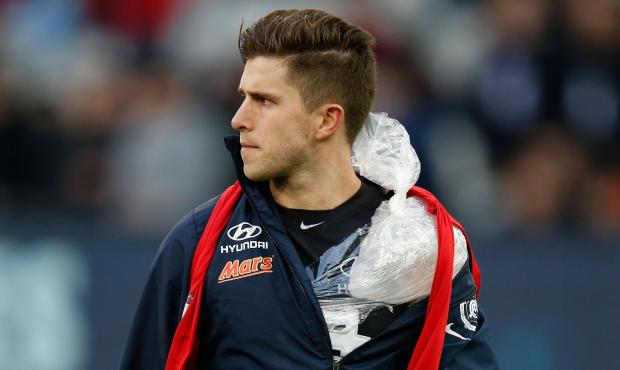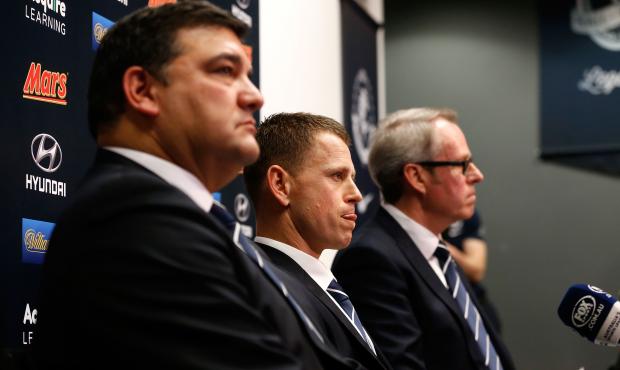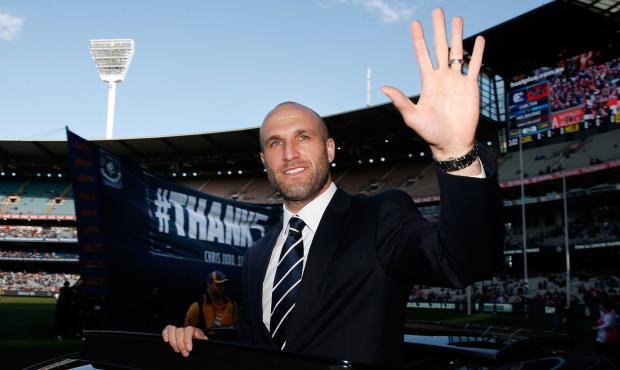1. Let the baker bake the bread
It's a saying that Carlton would do well to heed because in very recent times too many people – from the CEO to the coach to the president – have had too much say over list management, trade, development and welfare decisions. That approach does not bring success. While Stephen Silvagni is clearly the most influential figure in the club, he understands that he can't solve everything and needs to get the right people in the right positions and support them. Brendon Bolton is the most high-profile appointment as coach but football manager Andrew McKay, list manager Silvagni and CEO Steven Trigg must be allowed to perform without interference in the role they do best. Hawthorn is a model of consensus decision-making with no one leader wielding decision-making influence over another. Carlton had become anything but.
2. Develop a decisive list strategy
The clubs who seem to get rebuilds right hang on to early draft picks and trade according to where their list sits. In many ways the departure of Lachie Henderson, possibly Chris Yarran and even Matthew Kreuzer (although the Blues CEO says the ruckman is "as happy as a lark") works well for the Blues. They can get in early picks to go along with the likely No.2 pick to bring in real talent for Bolton to develop. Clarkson had six first-round picks in his first two seasons. It's time to secure Patrick Cripps long-term and stop recruiting virtual cast-offs as they have in the recent past. Bolton needs to decide whether Troy Menzel is important while he still has currency and set Dale Thomas a task to reclaim his former glory.
New Blues coach bolts early from Hawks
3. Back the on-field leaders
One of Hawthorn's great strengths – leadership – has been lacking at the Blues despite Marc Murphy's best efforts. The coach needs to back Murphy in and go about building the support he requires around him. A popular figure, Murphy has carried much of the midfield weight on his now damaged shoulders this season and it has brought him down in the end. He should captain the club in 2016 as the playing list stabilises and the connection between players and coach tightens. Bryce Gibbs and Matt Kreuzer seem good characters who can handle the extra responsibility while the next tier of developing leaders such as Cripps, Menzel, Nick Graham and Simon White are given time to concentrate on their football.
Marc Murphy should captain Carlton again in 2016, but he needs help. Picture: AFL Media
4. Put the players first
Carlton has always puffed its chest out and had a 'play for the jumper' mentality. That old-school approach does not suit the modern workplace that puts player wellbeing high on the agenda. AFL.com.au understands the departure of highly regarded former player and wellbeing manager Lyndall Down had a significant impact on the morale of the players and it is an area that needs strengthening. Bolton appears a relationship builder and he is young enough to relate to many of the players and listen to their concerns. He also knows what good player-driven clubs look like, having been at the Hawks. The Blues are riding tough financial times so every wish of the coach won't be met immediately but he must feel that he is getting all the support he needs to do his job.
5. Have hard conversations with staff
Bolton knows many of his football department staff face uncertainty and he will have ideas on the type of people he wants in specific roles. The group wants to train hard and the development structure needs to be streamlined to ensure it maximises the alignment with the Northern Blues. Does fitness coach David Buttifant stay and will Rob Wiley remain in development? Both are great football people but honest discussions will be needed to determine whether they fit into Bolton's plans. John Barker has won admirers for his work as interim coach and his wants need to be respected while inexperienced types such as Brad Green and Michael Osborne, who was at Hawthorn under Bolton, will have to sit tight.
6. Liven the place up
Clarkson often asked Bolton when he designed a training drill at the Hawks, "where is the fun in that?" Both men know that for all its thrills, football can be a grind so players need to be stimulated to learn rather than compelled to do so. It's why the Hawks have innovative methods of training to ensure competition and fun remains closely aligned. Bolton might ask players to get comfortable being uncomfortable but he won't stress them out and will reward effort. In fact, effort will be the overriding expectation in the next 12 months. Bolton will also create a learning environment that asks questions of players and expects them to take ownership of their development and understanding of the game. In American sport it's called flip learning and puts the onus on the athlete to take responsibility.
7. Quieten the board
For too long at Carlton, the often ill-informed opinions of powerbrokers either within or close to the club have had too much say over important decisions. Bolton has no ability to influence the board but the lines of communication need to be strong and the CEO needs to ensure the board is united and performing its role. The club needs to keep things simple and call meddlers out, with the line from board to CEO to football manager to coach aligned. It will require what Bolton calls on the football field, collective defence and offence.
President Mark LoGiudice, Bolton and CEO Steven Trigg are charged with rebuilding the Blues. 
8. Get the fans excited
Carlton should be ashamed that a once-powerful club that dominated the scene up until the early 2000s has become such a shadow of its former self, although the current regime has at least acknowledged its mistakes. It paid scant respect to supporters or the competition and it copped enough feedback to suggest it was wrong. Bolton comes from a hard but professional school at Hawthorn so it will be interesting to see what approach he takes at Carlton, given his post-match press conferences when filling in for Clarkson at Hawthorn in 2014 were refreshing. A straight-shooter, Bolton has a 'we, not me' approach but building the Carlton brand to the point where it is seen as a modern club once again will be one of his responsibilities. As all clubs know, however, winners sound much better than those representing the losing team.
9. Be modern, but not corporate
Arrogance is the best word to describe Carlton in recent years as it tried to buy its way out of trouble in a manner no longer relevant in the modern era. Bolton will emphasise the need for Carlton to have a shared set of values and standards, having come from the Hawks where success was built on four pillars – mateship, endurance, courage and sacrifice – enshrined when Alastair Clarkson took the team to Kokoda after he arrived for the 2005 season. Being reliable, not remarkable, is what he said is important but he might have to be remarkable to turn the Blues around.
10. Think big and dare to fail
Bolton strikes me as someone who sets expectations high and chases them. He is not daunted to be joining Carlton because he can't see the point in trying to achieve something that is obviously within your range. That is the driven side of Bolton's personality that many are yet to see. Any senior coach brings his personality to the club and it will be interesting to see how Bolton manages to be himself, set his imprint on the club and also keep his public face light enough for his message to get through.
Chris Judd was a Carlton champion but buying stars didn't get the Blues a flag. Picture: AFL Media


